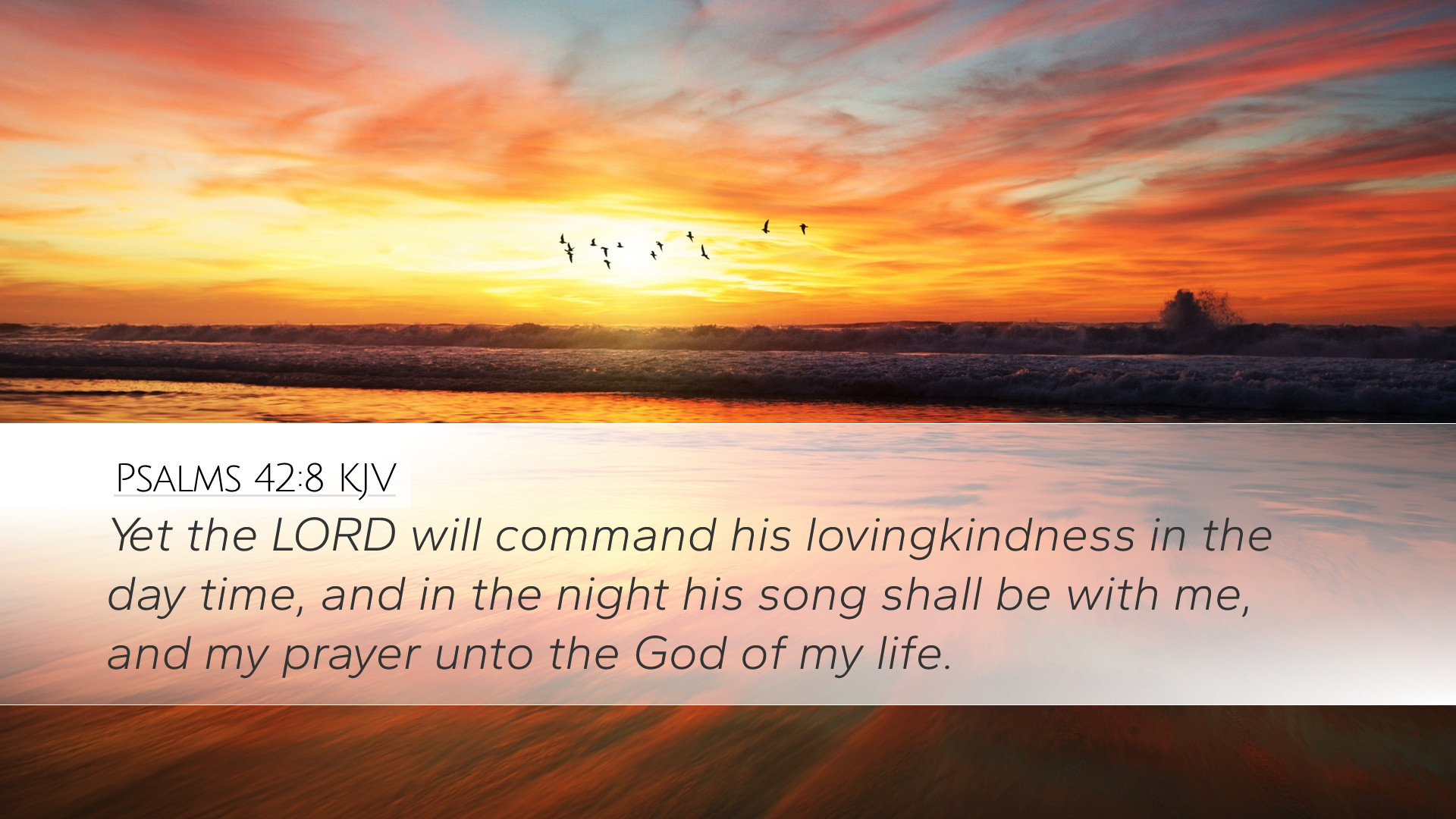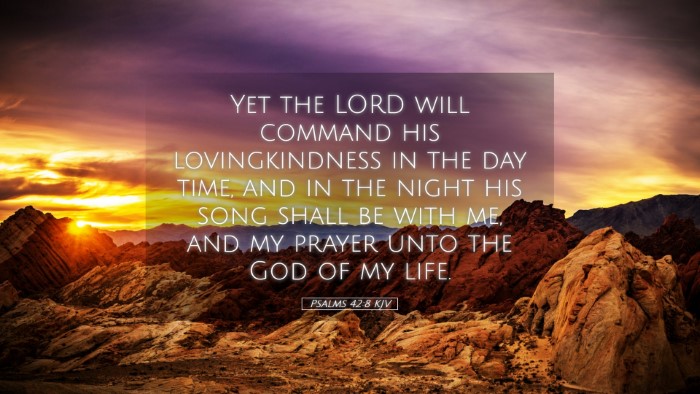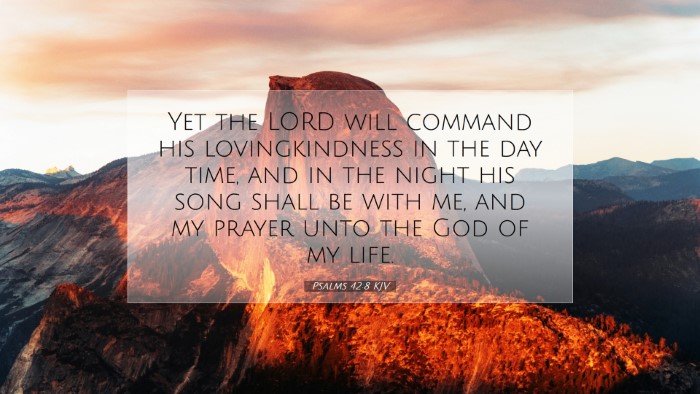Commentary on Psalms 42:8
Bible Verse: Psalms 42:8 - "Yet the Lord will command His lovingkindness in the daytime, and in the night His song shall be with me, and my prayer unto the God of my life."
Introduction
Psalms 42 is a poignant expression of longing for God amidst despair and sorrow. In this particular verse, the psalmist (traditionally believed to be David) reflects on the deep emotional struggles faced while simultaneously maintaining a steadfast hope in God's unwavering love and support. The interplay between darkness and light, despair and hope, is beautifully encapsulated in this verse.
Exegesis of Psalms 42:8
This verse can be examined through various theological and literary lenses, drawing from the insights of eminent commentators like Matthew Henry, Albert Barnes, and Adam Clarke.
The Assurance of God’s Kindness
Matthew Henry notes that the phrase "the Lord will command His lovingkindness" carries an assurance that God’s covenant love is not contingent upon our emotional state but is a sovereign act of divine grace. This underscores the unwavering nature of God’s love, which is promised to be present "in the daytime". The day symbolizes hope, activity, and visibility; thus, God’s lovingkindness is best experienced in the clarity of His presence when the psalmist feels closest to Him.
The Night Song
Albert Barnes emphasizes the significance of "His song shall be with me in the night". The "night" often represents times of trial, confusion, and spiritual darkness. Here, the psalmist's declaration indicates a profound truth: even in the depths of despair, God orchestrates a song—a reminder of His constant presence. This song might be a means of comfort, encouragement, and a source of strength during painful times, reflecting the joy that can bubble up from deep within even when circumstances are dire.
Prayer as a Lifeline
According to Adam Clarke, the phrase “my prayer unto the God of my life” demonstrates an intimate connection between the psalmist and God. The psalmist acknowledges God as the source of life, and prayer is portrayed not merely as a ritual, but as a vital lifeline. Clarke underscores that this relationship is one that provides sustenance and reassurance; the psalmist's earnest prayers reveal an acknowledgment of God’s authority and a desperate plea for divine intervention.
Theological Implications
The theological implications of Psalms 42:8 are profound for both personal spirituality and communal worship. This verse presents a holistic view of faith, demonstrating that feelings of despair and doubt can coexist with unwavering trust in God's goodness and mercy.
- The Reality of Human Emotion: The psalmist expresses vulnerability and sorrow, which resonates with many believers today. It highlights the importance of authenticity in faith, acknowledging that struggles do not negate one’s relationship with God.
- The Assurance of God’s Presence: The affirmations in this verse serve as a reminder that God is always present. Even when He seems distant during our trials, His love and kindness remain constant. Church leaders can use this as a comforting truth when ministering to others in distress.
- The Role of Worship: The mention of song in the night draws attention to the importance of worship and praise in maintaining one’s spiritual life. Worship can transform a believer’s perspective, bringing new light into the darkness.
- The Power of Prayer: The text emphasizes the vital nature of prayer in a believer's life. It serves as an anchor during times of trial, reaffirming one’s reliance on God as the "God of my life." This presents a model for prayer that is grounded in an understanding of God’s attributes.
Pastoral Application
For pastors and leaders in the church, Psalms 42:8 can guide the approach to ministry for those facing spiritual dryness or emotional struggles. Here are a few applications:
- Validate Struggles: Acknowledge the real experiences of pain and longing that congregants face, and create an environment where it is safe to express these feelings.
- Encourage Worship: Promote times of worship that reach into the "night" of despair to bring hope and healing, reminding people that they can encounter God even in the shadows.
- Teach on Prayer: Offer teachings or workshops on prayer that emphasize its importance as a lifeline and provide practical ways to cultivate a vibrant prayer life.
- Integrate Scriptures: Infuse the messages with the assurance of God’s love illustrated in this psalm, enhancing the congregation’s understanding of God's constant presence and faithfulness.
Conclusion
Psalms 42:8 serves as a pivotal reminder of God's abiding love and faithfulness, even amid life’s challenges. The synthesis of insights from Matthew Henry, Albert Barnes, and Adam Clarke enriches the understanding of this verse, reinforcing the dual reality of human despair and divine reassurance. By internalizing the truths found in this verse, both individuals and communities can navigate the complexities of faith with renewed hope and commitment to God, the source of life and joy.


